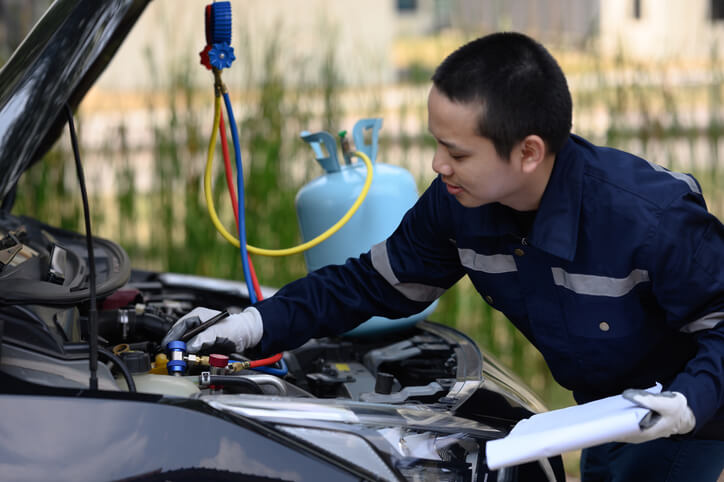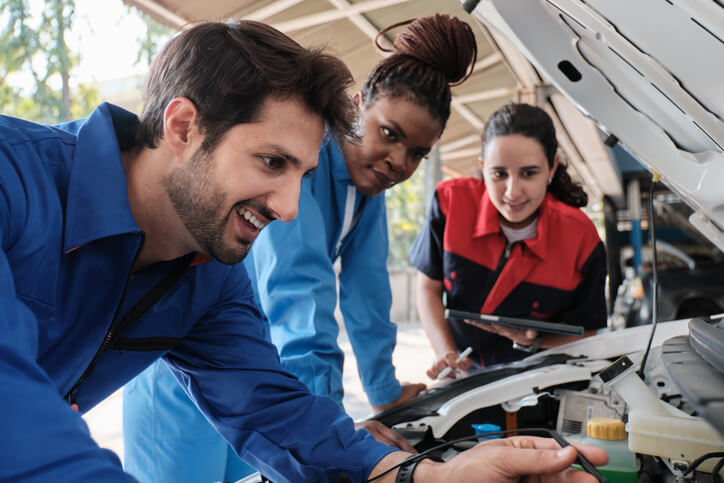Keeping Your Cool: A/C Refrigerants and Climate Control in Modern Cars
Few systems in a vehicle affect comfort as directly as the air conditioning system. And in today’s auto mechanic training, understanding how to maintain, diagnose, and repair climate control systems is a vital skill for any aspiring technician.
With rising environmental standards, evolving refrigerants, and advanced climate systems, the A/C unit is no longer just a simple luxury; it’s a critical area of expertise in automotive training.
Why Climate Control Systems Matter
Modern drivers expect comfort, regardless of the weather. That means heating, ventilation, and air conditioning (HVAC) systems need to work efficiently year-round. But these systems don’t just control cabin temperature. They’re also integrated with sensors, computers, and fuel efficiency settings. When they fail, it’s not just an inconvenience; it can impact visibility, air quality, and safety.
That’s why auto mechanic school programs now place more emphasis than ever on A/C diagnostics, refrigerant handling, and climate system technology.
The Evolution of Refrigerants
Refrigerants are what make vehicle air conditioning work. They circulate through the system, absorbing and releasing heat to cool the air. But not all refrigerants are created equal.
Older vehicles relied on R-12, a chlorofluorocarbon (CFC) that was phased out due to its ozone-depleting effects. It was replaced by R-134a, which is still common in many vehicles but is also being phased out for environmental reasons.
Today, the industry is shifting toward R-1234yf, which is a more environmentally friendly refrigerant with a significantly lower global warming potential (GWP). While safer for the planet, it requires different tools and safety procedures, making proper automotive training essential.
Students learning in a modern auto mechanic school will now encounter all three types, especially when working with a variety of vehicle models. Understanding the differences, safe handling, and proper disposal methods is a core competency in modern programs.

What Technicians Learn About A/C Systems
At schools like ATC Cambridge, A/C training includes both classroom theory and hands-on application. Students learn how to:
- Identify common system failures (e.g., leaks, compressor issues)
- Use refrigerant recovery and recycling machines
- Interpret pressure readings from manifold gauge sets
- Diagnose electrical components like blower motors, switches, and sensors
- Handle refrigerants safely under provincial and federal regulations
Students also gain exposure to hybrid and electric vehicle A/C systems, which are often electrically powered and require different diagnostic tools. These systems may use heat pumps or advanced thermal management systems that integrate battery cooling with cabin comfort, adding another layer of complexity.
Environmental and Legal Considerations
Because refrigerants are classified as hazardous, improper handling can lead to fines or health risks. Technicians need to be certified in refrigerant recovery and follow strict guidelines when working with A/C components.
That’s why a certified auto mechanic training program doesn’t just teach how the systems work; it teaches why safety and compliance matter. Graduates don’t just know how to fix A/C systems, they know how to protect themselves and the environment while doing it.
Why It Matters for Your Career
Mastering climate control systems sets you apart in the job market. Shops rely on technicians who can work with modern refrigerants and meet today’s emissions standards. It’s not just about keeping vehicles cool; it’s about staying current with changing regulations and technologies.
By choosing the right auto mechanic training program, you’ll build a foundation in this critical skill area and gain hands-on experience with the same tools used in real auto shops.

Get Started With Auto Mechanic Training at ATC Cambridge
If you’re looking to work with advanced automotive systems, start with the right education. ATC Cambridge offers hands-on, job-focused auto mechanic training that prepares you for real-world challenges, including A/C and climate control systems. Whether you’re working on hybrids, electric vehicles, or older models, you’ll graduate with the confidence and skills to thrive in a modern garage.
Are you looking for comprehensive automotive training?
Contact ATC Cambridge for more information.


